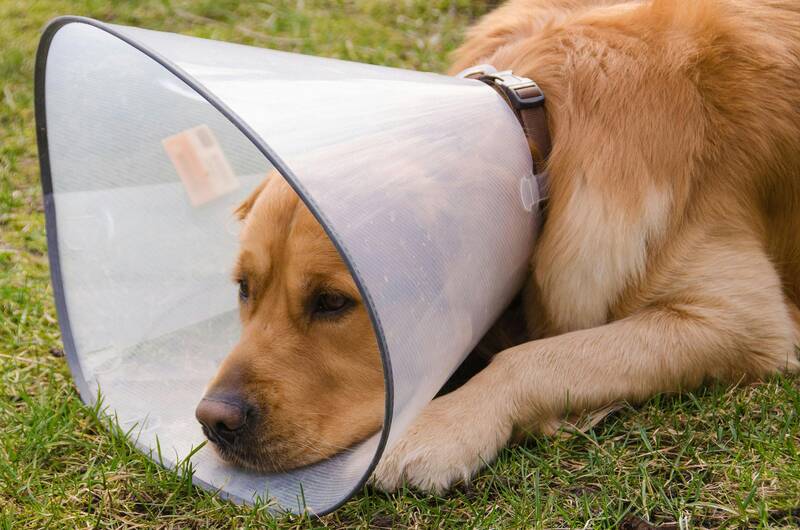Ask people around you what kind of dog breed they love most, and many of them would say Golden Retriever. Since 1991, these adorable, goofy, and affectionate guys have always been holding the No. 1 spot on the American Kennel Club’s list of the most popular breed. Whether you take them on a hike or snuggle with them in bed, they will be equally content. It’s why they shine as guide dogs and devoted family members.
Although they are generally healthy dogs, those looking to adopt a Golden Retriever should be aware of the lifetime responsibility they are taking on. Like many purebred dogs, the most common Golden Retriever health issues come from years of unethical breeding. Let’s explore the top health concerns with us in today’s article.
Understanding Golden Retriever Health Concerns

Before we dive into specific health issues, it’s important to note that not all Golden Retrievers will experience these problems. However, being aware of potential health concerns can help you catch and address issues early, ensuring your pup lives a long, healthy life.
1. Hip Dysplasia: A Common Concern
A survey from the Orthopedic Foundation for Animals shows that roughly 20% of Golden Retrievers have defective or dysplastic hips, meaning the bones don’t come together properly. The root cause of this deformity is a combination of hereditary and environmental problems.
Other factors that lead to this condition, particularly in bigger breeds like Golden Retrievers, are inappropriate exercise, excess weight, and an inadequate diet. Symptoms include:
- Difficulty getting up and lying down
- Lower energy
- Loss of thigh muscle mass
- Joint stiffness
- Consistent pain
Veterinarians have several methods to treat hip dysplasia, including a specific diet, anti-inflammatory medicines, and hip replacement surgery for severe cases.
2. Progressive Retinal Atrophy (PRA): Dimming the Lights
Progressive Retinal Atrophy, or PRA, is a genetic disease affecting a dog’s eyesight. It’s like a slow dimmer switch for your Golden’s vision. Initially, you might notice your pup having trouble seeing in low light conditions, a symptom known as night blindness. As the disease progresses, their daytime vision will also start to deteriorate.
While there’s no cure for PRA, early detection can help you and your Golden adjust to the changes. Regular eye check-ups are crucial. If you notice your dog bumping into objects or seeming hesitant in new environments, it’s time for a vet visit.
3. Hypothyroidism: When Metabolism Takes a Vacation
Hypothyroidism occurs when your Golden’s thyroid gland doesn’t produce enough thyroid hormone. Think of it as your dog’s metabolism taking an unwanted break. The signs can be subtle at first – your once energetic pup might seem more sluggish, or they might start gaining weight despite no changes in diet.
Other symptoms to watch for:
- Hair loss, especially on the tail
- Skin problems
The good news is that once diagnosed, hypothyroidism is easy to manage with daily thyroid hormone replacement medication. Regular blood tests will help your vet adjust the medication as needed.
4. Seizure
The causes of seizures in Golden Retrievers range from epilepsy, infection, exposure to toxins, and even brain tumors. Some symptoms of seizures are:
- Sudden and uncontrollable shaking
- Urination
- Drolling
- Loss of consciousness
In most cases, a seizure will last for a few minutes, and the dog may be disoriented and fatigued afterward. It’s critical to bring your Golden Retriever to the vet right away. The vet will perform diagnostic testing to identify the source of the seizure and prescribe medications. Many dogs with seizures are still able to lead long, happy lives with the right care and attention.
Read more >> Golden Retriever Eye Problems
5. Golden Retriever Allergies: When the World Becomes an Irritant

Allergies are a common issue for many dogs, including Golden Retrievers. These allergic reactions occur when the dog’s immune system responds to a substance it perceives as hazardous, even when it isn’t. Allergies in Golden Retrievers can be triggered by various factors:
- Environmental factors: Pollen, dust mites, mold spores
- Food: Beef, chicken, dairy products, wheat, soy, eggs
- Parasites: Flea saliva (Flea Allergy Dermatitis)
- Contact allergies: Certain fabrics, cleaning products, plastic or rubber materials
- Skin irritants: Shampoos or grooming products, certain plants
If you notice your Goldie scratching more than usual, developing frequent ear infections, or having tummy troubles, it’s time to investigate potential allergies. Your vet can help identify triggers and develop a management plan.
6. Ear Infections: Those Adorable Floppy Ears Have a Downside
Golden Retrievers are prone to ear infections due to their floppy ears, which can trap moisture and debris. Watch out for signs like:
- Frequent head shaking
- Scratching at the ears
- Unpleasant odor from the ears
- Redness or swelling in the ear canal
- Dark discharge
Regular ear cleaning with a vet-approved solution can help prevent infections. It’s especially important to dry your Golden’s ears thoroughly after swimming or bathing.
7. Obesity: When Love Handles Aren’t So Lovely
Golden Retrievers love their food, and they’re experts at giving those irresistible “please feed me” eyes. However, overindulgence can lead to obesity, which can exacerbate other health issues and reduce overall quality of life.
As a general rule, you should be able to feel your dog’s ribs without pressing too hard, and they should have a visible waist when viewed from above. If you’re unsure, your vet can help assess your dog’s body condition and develop a weight management plan if needed.
8. Bloat: A Serious Emergency
Also known as gastric dilation volvulus, bloat is commonly seen in dog breeds with deep and narrow chests. Even after intensive medical care, it still kills 30% of the affected dogs, Thus, it’s a true emergency that should never be overlooked.
The condition occurs when air fills the dog’s stomach, accumulating pressure and obstructing the return of blood from the abdomen to the heart. The dog then goes into shock as a result of blood pooling in the hind body, which significantly lowers blood volume.
Symptoms of bloat are:
- Enlarged abdomen
- Restless behaviors
- Unsuccessful attempt to vomit
- Heaving or retching
- Dog lying in prayer position
Your Goldie will be more prone to bloat when eating too much at once. Our veterinarians suggest feeding smaller, more frequent meals, and using slow-feeder dog bowls to control portion sizes.
9. Arthritis: The Golden Years Challenge
As Golden Retrievers age, they become more susceptible to arthritis, a condition characterized by inflammation in the joints. You might notice your once-spry pup becoming reluctant to jump into the car or climb stairs.
While we can’t turn back the clock, there’s a lot we can do to keep our arthritic Goldens comfortable. Weight management, joint supplements, and low-impact exercises like swimming can help maintain muscle strength and joint flexibility.
10. Cancer: A Tough but Important Topic
We love our Golden Retrievers so much, and the thought of them suffering from cancer seems unbearable. As responsible pet parents, we still have to face the truth, though: Their risk of developing certain types of cancer at any time in their lives is higher than that of other breeds. According to research, Goldies are predisposed to osteosarcoma, mast cell tumors, hemangiosarcoma, or lymphoma.
This is not to say that your fur baby is doomed to a painful fate, but a reminder to always keep an eye out for the signs. Early detection determines whether your pet can receive timely treatment. If you notice any of these cancer symptoms in Golden Retrievers, visit the vet right away:
- Abnormal weight loss
- A lump or bump on the skin
- Appetite loss
- Wounds that are unable to heal
- Bad odor
- Trouble breathing
- Lethargy
Preventing Golden Retriever Health Issues

While we can’t prevent all health issues, there’s a lot we can do to keep our Golden Retrievers in top shape. Here are some key preventive measures:
- Maintain a Healthy Diet: Consult with your vet to determine the optimal body weight for your Golden Retriever and choose the best food for their age, health condition, and lifestyle.
- Regular Exercise: Aim for at least 30-60 minutes of activity daily. Regular exercise improves your Goldie’s entire body, including muscles, heart, and lungs.
- Routine Veterinary Care: Regular check-ups are crucial for catching potential health issues early. Don’t skip these check-ups, even if your dog seems healthy.
- Genetic Testing: Consider genetic testing to identify potential hereditary conditions before symptoms appear.
- Proper Grooming: Regular grooming isn’t just about keeping your Golden looking their best – it’s also an opportunity to check for any unusual lumps, bumps, or skin issues.
- Dental Care: Maintain a dental care routine to prevent periodontal disease and related health issues.
- Environmental Management: Create a safe home environment for your Golden, securing toxic substances and ensuring your yard is free from harmful plants.
- Mental Stimulation: Provide plenty of mental stimulation through puzzle toys, training exercises, and varied activities.
- Spaying/Neutering: Consider spaying or neutering your Golden to prevent certain cancers and other health issues.
Conclusion
Golden Retrievers are loving companions that bring joy to our lives. By understanding common Golden Retriever health issues and taking preventive measures, we can help ensure our furry friends lead long, healthy, and happy lives. Remember, every Golden Retriever is unique, so it’s important to work closely with your veterinarian to create a tailored health care plan. With dedicated care and attention, you and your Golden Retriever can enjoy many wonderful years together.

As a professional writer who specializes in canine care, I have spent a significant amount of time researching and writing about Golden Retrievers. While I do not own a Golden Retriever, my considerable research and collaboration with doctors, breeders, and Golden Retriever experts has provided me with a lot of information about this incredible breed. My writing covers a wide range of topics, from food and health concerns to behavior and training, to assist owners in raising well-rounded, healthy golden retrievers. Through this website, I wish to share my knowledge and positively touch the lives of both dogs and their humans.
